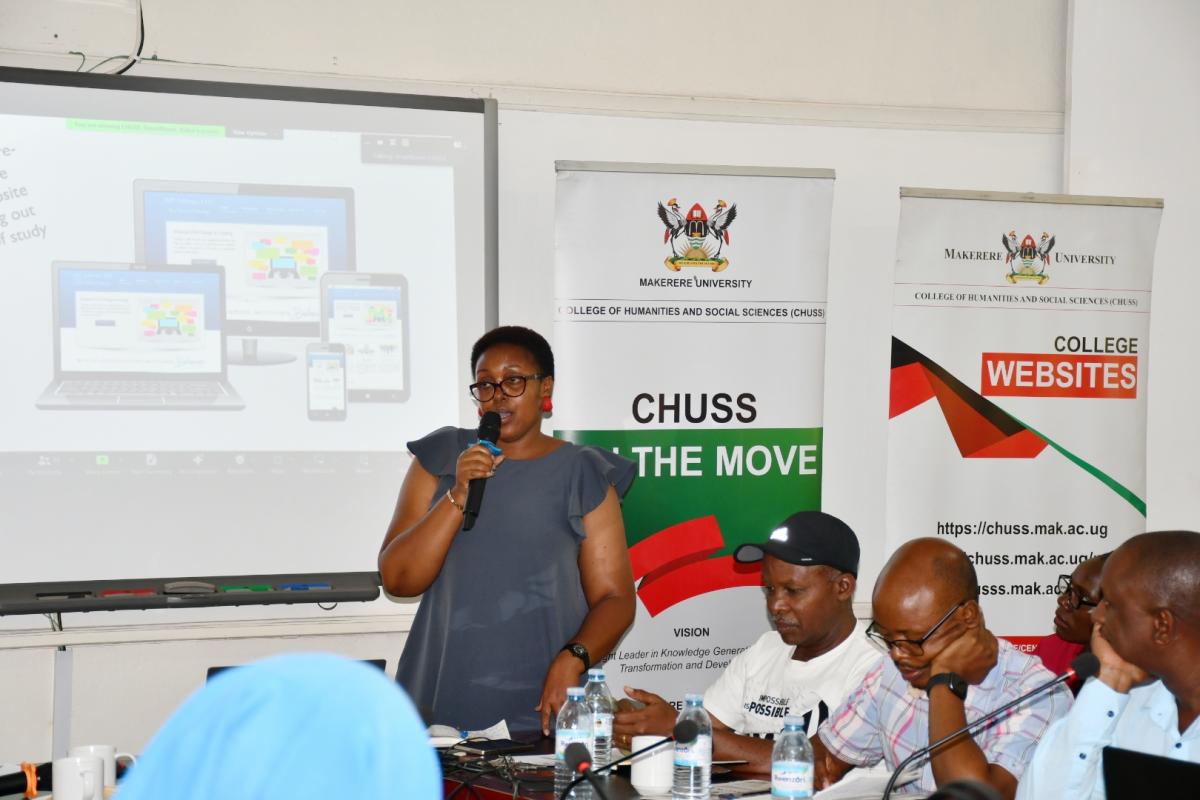
Over 130 participants took part in the highly interactive pre-application workshop for the Inter-disciplinary PhD Programme by Research in the Fields of Historical Humanities and Humanistic Social Sciences scheduled to begin in September 2024 and end in June 2027.
The hybrid workshop held on Saturday 9th March 2024 follows the release of the Call for Applications by the College of Humanities and Social Sciences (CHUSS) for ten positions leading to the award of a PhD in the fields of Humanities and Social Sciences of Makerere University. The completed application forms ought to be submitted by Friday, March 29, 2024.
During the pre-application workshop, several experts and facilitators were lined up to provide a holistic understanding and appreciation of the Call for Applications, paying extra attention to guidelines, expectations, and processes. In addition, PhD graduates who were able to study and complete the PhD in three years were also lined up to share experiences and inspire the prospective applicants to embrace this research journey.
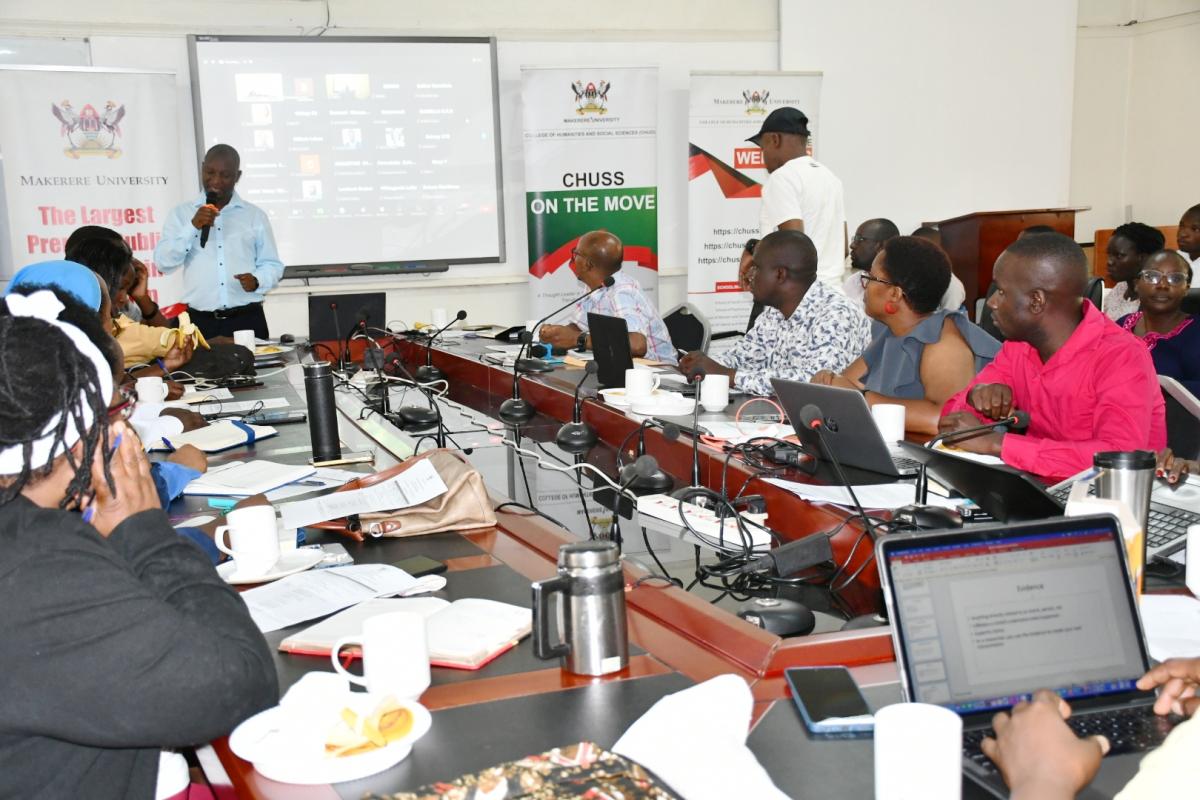
The team of seasoned facilitators included: Dr. Zaid Sekito, Dr. Kajumba Mayanja, Dr. Evelyn Lutwama-Rukundo, Dr. Resty Naiga, Dr. Merit Kabugo, and Dr. Badru Bukenya.
The Presenters with tested and proven experience included: Dr. Edgar Nabutanyi, Associate Professor Patrick Mangeni, Dr. Levis Mugumya, Dr. Pamela Khanakwa, Dr. Abudul Mahajabu, Dr. Josephine Lutaaya Kakeeto, Dr. Resty Naiga, Mr. Samuel Okok and Ms Lillian Mbabazi.
The programme is fully funded by the Gerda Henkel Foundation of Dusseldorf Germany and is tenable at Makerere University. The scholarship covers all costs of PhD training and the maximum value of the scholarship payable to each fellow in 2024 is approximately USD 8,200 which will be paid to the fellows in Uganda Shillings equivalent per year.
In the Call for Applications, preference is accorded to projects that approach the study of the Humanities and Social Sciences in the fields of: Classics namely Literature, Philosophy, Epic, and Drama; Prehistory/Early History of Africa; Archaeology; Modern African History; Sociology; Anthropology; Language and Linguistics, Creative Arts in Africa, Religion in Africa, Political theory and Gender Studies.
The Historical Humanities and Humanistic Social Sciences include but are not limited to a cluster of subjects (disciplines) that study human society with a particular sensitivity to the shifting historical contexts over time, with various kinds of evidence to support analyses of what informs and shapes the changes and the implications of such changes in human society.
The presentations guided prospective applicants on how to; write a winning fellowship proposal, and understand the CHUSS 2024 Call especially the question of historical humanities and historicizing the humanities. Presentations also covered experiences of a Gerda-Henkel Alumni on managing timelines, preparing the application package and issues to watch out for, the CHUSS application form, and lived experiences of applicants who competed and succeeded in the earlier call for application.
Welcoming the prospective applicants and participants to the workshop, the Principal, Prof. Josephine Ahikire revealed that the College of Humanities and Social Sciences is interested in creating the next generation of scholars. The big picture, she emphasised, is about producing all-round African scholars with ability to transform lives and society in general.
Prof. Ahikire noted that graduate training is central to the transformation of Makerere University into a research-led institution. In this regard, the College of Humanities has prioritized all processes aimed at increasing the number of graduate students. During the 74th graduation ceremony of Makerere University, the College of Humanities and Social Sciences produced the highest number of PhDs (to be specific 30). She added that CHUSS will therefore continue to come up with strategies aimed at empowering graduate students (at Masters and PhD levels) as well as provision of support to prospective applicants. Prof. Ahikire expressed gratitude that the pre-application workshop for the 2024 cohort was a deliberate effort feeding into the College’s strategy of increasing the number of graduate students.
The Deputy Principal, Dr. Eric Awich Ochen disclosed that the College had embarked on developing other projects, which would open doors for many more research and funding opportunities. Taking into consideration, the competitive nature of the Call and the stakes involved, he advised the prospective applicants to adequately prepare themselves for the application process.
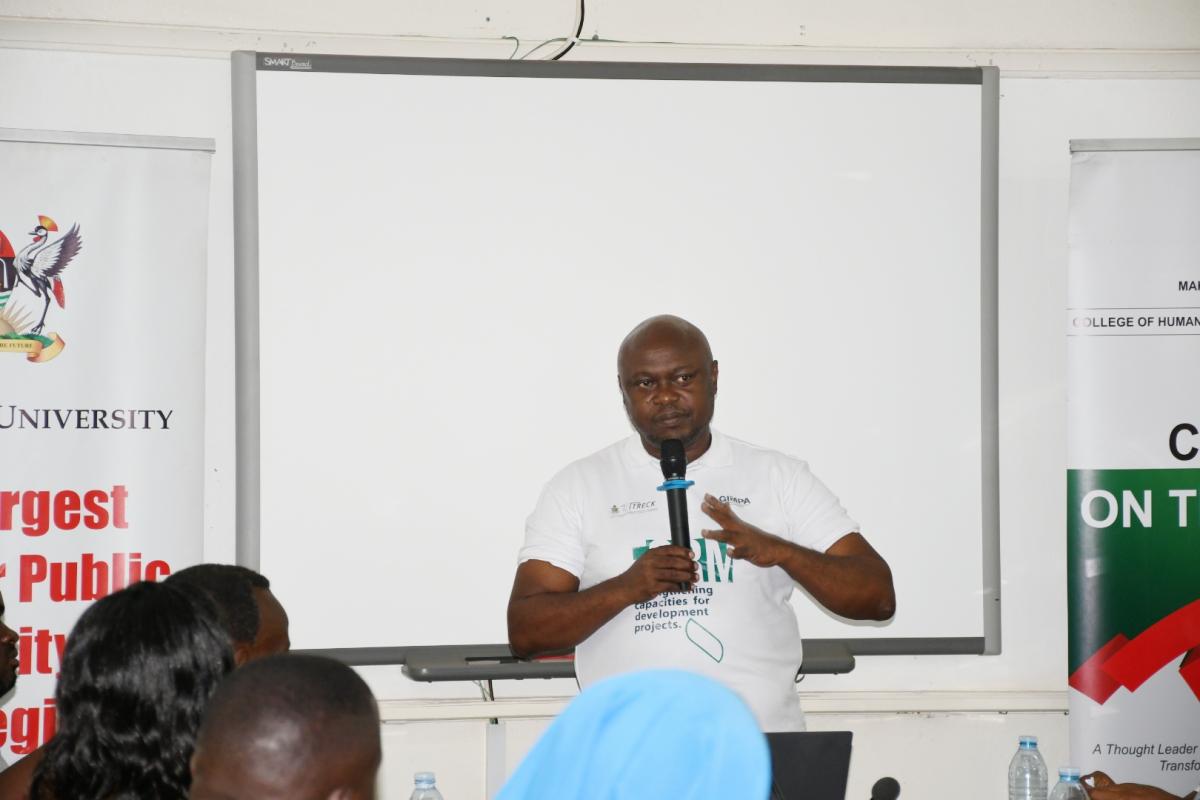
“You should have a particular area of focus. This is a very popular programme where students come from different parts of the world. It is a very competitive call. Those who qualify should invest time and effort to put in a very competitive application. You should give your application ample time. Do not wait for a few days to the deadline to start the process. PhD is a journey which is completed not by the brightest among you, but the most consistent and most committed,” said Dr. Awich Ochen.
The Programme Coordinator, Dr. Edgar Nabutanyi pointed out that pre-application workshop is informed by lived experiences of both the instructors and the students who are already on the programme. He shared that when the programme started in 2017, some of the applicants had interesting and valuable thought-provoking ideas, but failed to package them. Additionally, some of the applicants failed to adhere to instructions as well as the demands that had been clearly stipulated in the call for applications. He said that whereas this had presented a challenge to his team, it also birthed the idea of a pre-qualification workshop.
“As we were wrapping up our retreat, we thought that it would be important in whatever form to have a pre-application workshop to highlight the guidelines, give suggestions and ideas of how to improve your application package so that it is complete. You should also focus on ensuring that your application stands out. You may have an obviously good application with very interesting research prospects, and you fail to adhere to the rules and regulations,” he said.
Dr. Nabutanyi elaborated that ever since the pre-application workshop was introduced, the fellowship programme has been very competitive and over 150 applicants have been recorded for each cohort. This re-affirms the need for this pre-application workshop that substantially helps the prospective applicants to receive useful information.
In his presentation, Associate Professor Patrick Mangeni tipped the prospective applicants on the need to accord the entire process enough time, preparation and concentration because a number of people or organisations that offer scholarships and fellowships look for those whose proposals stand out. He urged them to critically read both the call and the application form. He then shared the dos and don’ts of writing a winning proposal and some of the things they need to observe when writing.
“If you look at the call and the application form, the dos and don'ts are clearly implied. The application form also gives you the ideas about what you should do or not do. The call specifies who is eligible and the timelines,” he said.
Associate Prof. Mangeni advised the prospective applicants to focus on key aspects such as the aim of the dissertation, the research question as well as specific, concrete and achievable objectives.
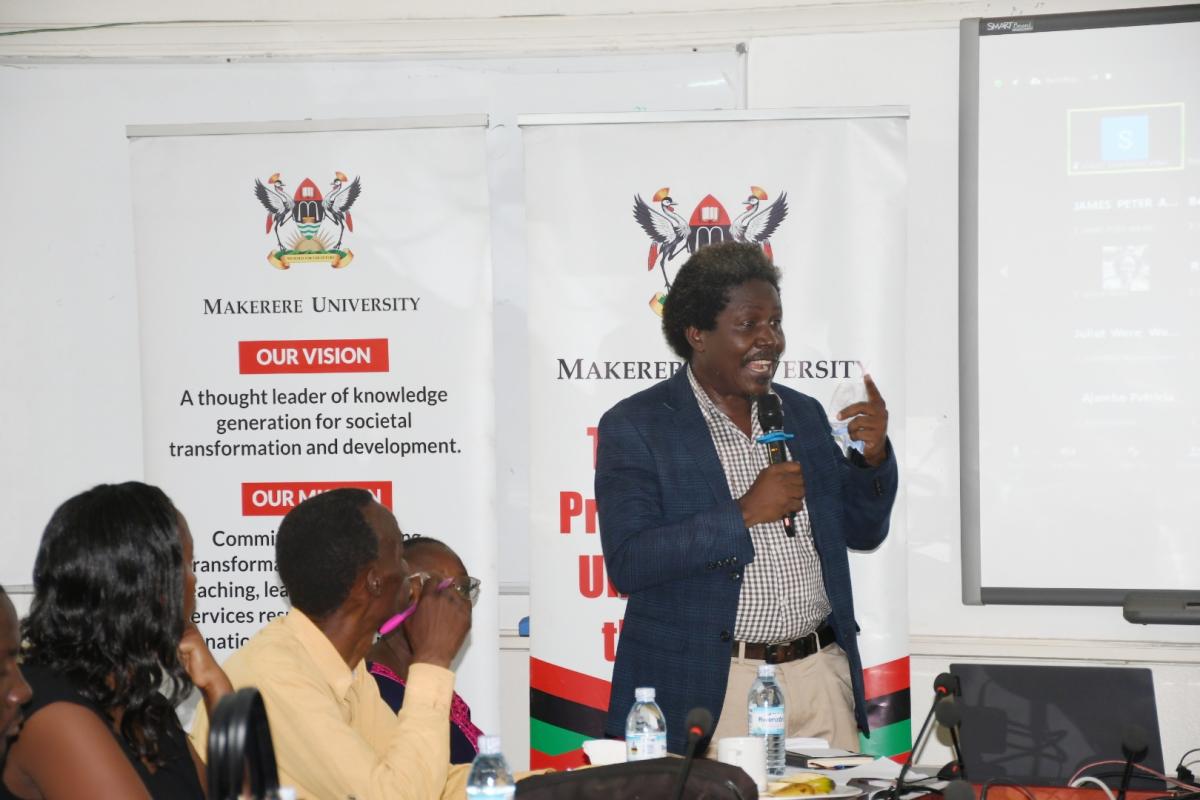
“When you look at the background, it clearly tells you that the preference is historical humanities and humanistic social sciences. It provides the subjects or the disciplines of focus. So, that is precisely what we are expecting. Preferences will be accorded to projects that approach the study of the humanities and social sciences. When you look at the application form, there is certainly an aspect of it that speaks to that and the selection team will look for these elements in your work,” he said.
He cautioned the prospective applicants against being overly ambitious and making claims without evidence. He guided that evidence is either through references or being able to quote the particular source. He requested them to ensure that their work is thoroughly revised before submission of the application. He suggested that they could engage an editor or somebody to help with the aspects of language. He appealed to them to positively receive feedback about their work because it is very critical.
Regarding the project budget, Associate Professor Mangeni underscored the need for a realistic budget. “The budget should be aligned with the work plan. Please do not introduce new items into the budget which were not a part of what was catered for,” he guided.
He stressed the need for applicants to choose referees who are relevant to the study and discipline. He disclosed that a number of applicants are not cautious when it comes to choosing referees.
“When you go to the referees that you will choose, they need to speak to your study; don't select your referees randomly. There are cases where applicants have not been able to move to the next stage because either the reference was submitted late or the referee just talked of other good things about the prospective applicant that are not relevant to the work. So select your referees carefully, and also share with them the application, the call and the timeline,” he advised.
Dr. Levis Mugumya, Head-Department of English Language Studies and Communication Skills noted that the programme had registered great success and applauded the Gerda Henkel Foundation for funding for the PhD programme. He mentioned that some students had graduated since the Programme’s inception in 2017, while quite a number of them (from the recent cohorts) were enrolled on the programme.
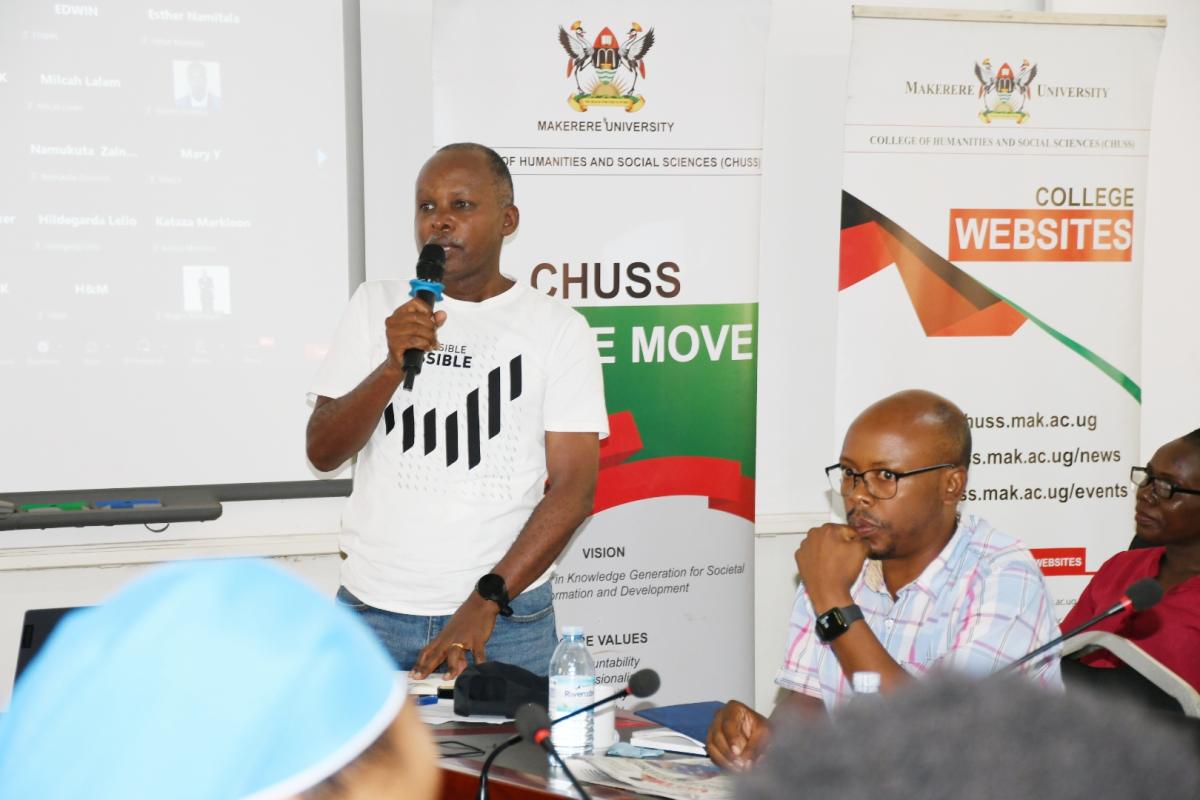
“Funding for humanities does not come easily. To get funding for humanities is a big task. We thank Gerda Henkel Foundation for coming on board to fund this PhD programme under the College of Humanities and Social Sciences,” he remarked.
Dr. Mugumya reiterated that the competition is stiff, which gives credence to the pre-application workshop to ensure that the prospective applicants are guided as they prepare to respond to the call for applications.
Presenting the CHUSS 2024 Call, Dr. Mugumya, who is also one of the Coordinators of the PhD programme explained that under this PhD by research, the student is expected to work independently with his or her supervisor(s).
“The applicants should possess research experience in the Humanities and Social Sciences at a University or a Research Institute and a strong foundation in writing and research methods is desirable. Since it is a PhD by research, applicants should demonstrate capacity for independent work. They should also have excellent interpersonal and problem-solving skills,” he said.
On the issue of eligibility, candidates for the PhD programme should be Ugandan nationals or nationals of a Sub-Saharan African country, under the age of 40 years (male) or 45 years (female) by September 30, 2024 and holding honors undergraduate degree as well as Master’s degree in the Humanities and Social Sciences discipline related to the specialization they are applying for from a recognized university. They should also confirm their availability from September 2024 to undertake a three-year full-time study at Makerere University.
Speaking about the question of historical humanities and historicizing the humanities, Dr. Pamela Khanakwa, Dean School of Liberal and Performing Arts and a committee member of the programme defined it as a cluster of subjects or disciplines that study human society and highlighted human society with a particular sensitivity to the shifting historical contexts.
Dr. Khanakwa specified that depending on what the applicant’s project may be, they expect that the actors are what they call historical actors and there are people involved and they are the ones whose ideas or actions that are to be interrogated.
“If we are talking about human societies, we expect you to be talking about humans. You may consider individuals or persons who share norms, values and beliefs because you will be thinking about studying whether it's a specific event, person or community. It is happening amongst groups of people or individuals hence social interactions,” she remarked.
Dr. Khanakwa implored the prospective applicants to have a high regard for evidence in their research. “Evidence helps us to have a better understanding of what happened. Use evidence to support your claims. As a researcher, use the evidence to create your own interpretation. Evidence is what makes your study original,” she said.
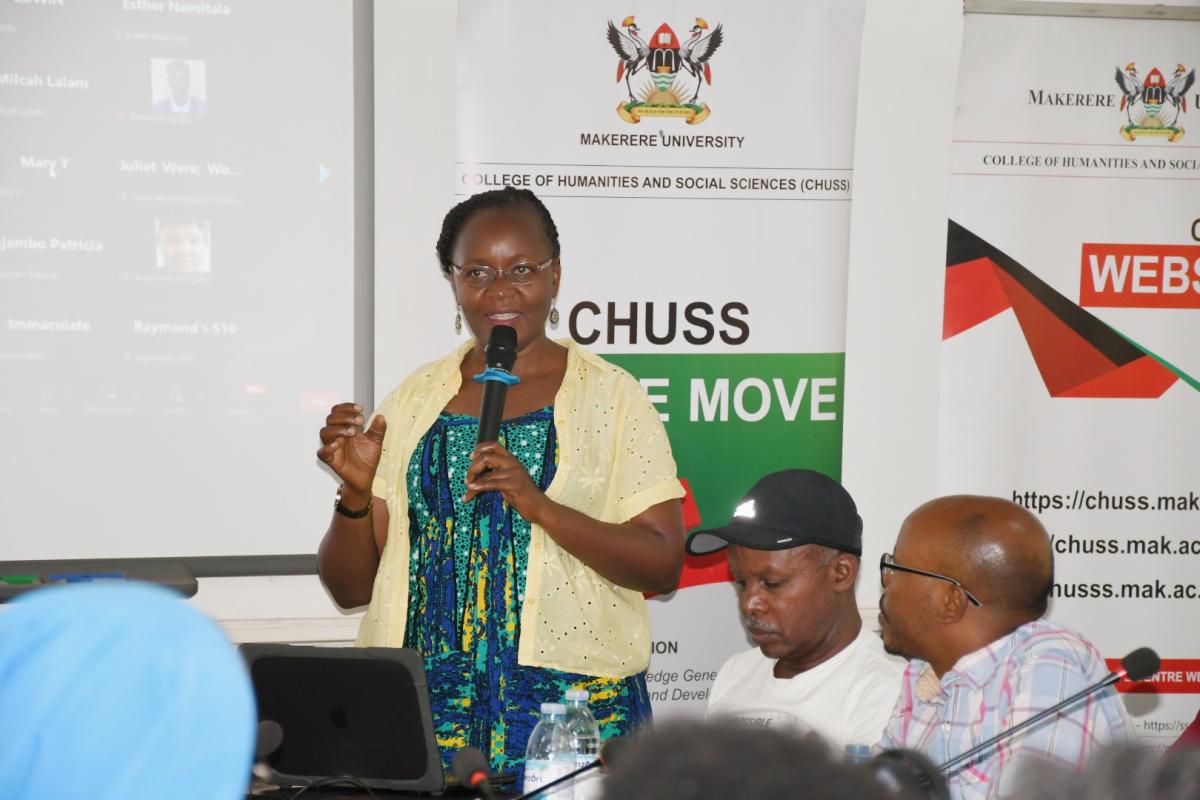
Providing tips on preparing the application package, Dr. Josephine Lutaaya Kakeeto from the School of Education, Department of Humanities and Language Education explained that a package means ensuring that you have assembled all the required documentation to support your application.
“It important to develop a checklist because there is a lot of documentation that needs to be worked on. You need to check alongside what is appearing in the call. Are you from the designated countries? Do you have the necessary documents, Master's and undergraduate, in the stipulated degree? Are you within the target age group? Can you confirm that you will be allowed to undertake this Doctoral studies on a full-time basis? So you need to make that checklist.” She said.
Dr. Lutaaya Kakeeto stated that there is an experienced vetting team that will look at the applicant’s package to make sure that they follow the requirements. “What must we do in order to make our application package stand out? These are the issues to watch out for and it will be in three stages; what should we do before the application, what should we do or know during the application, and what should we do when we are submitting the projects?”
She advised the applicants to always get to the right people and highlight the commendable skills in line with the area of study. She added, “They need you to specify tasks, projects, courses and course units that you would accomplish under their guidance so that they are able to confirm that you are academically prepared and psychologically ready to undertake a doctoral study.”
Focusing on the CHUSS Application Form, Dr. Resty Naiga, Head of Department of Development Studies, CHUSS advised the prospective applicants to be intentional and deliberate about having a PhD. “You should know what you want and show how what you do is related to what you want to study. You should also state what you have contributed in terms of research undertaken,” she said.
Dr. Naiga highlighted that the title should have a maximum of 15 words. The prospective applicants should ensure that they have an Abstract, which is the summary of their proposal. This process also involves defining objectives, the statement of the problem, pointing out the gap in the Literature, developing research questions from the statement of the problem and gap in the literature as well as presentation of relevant supporting documents.
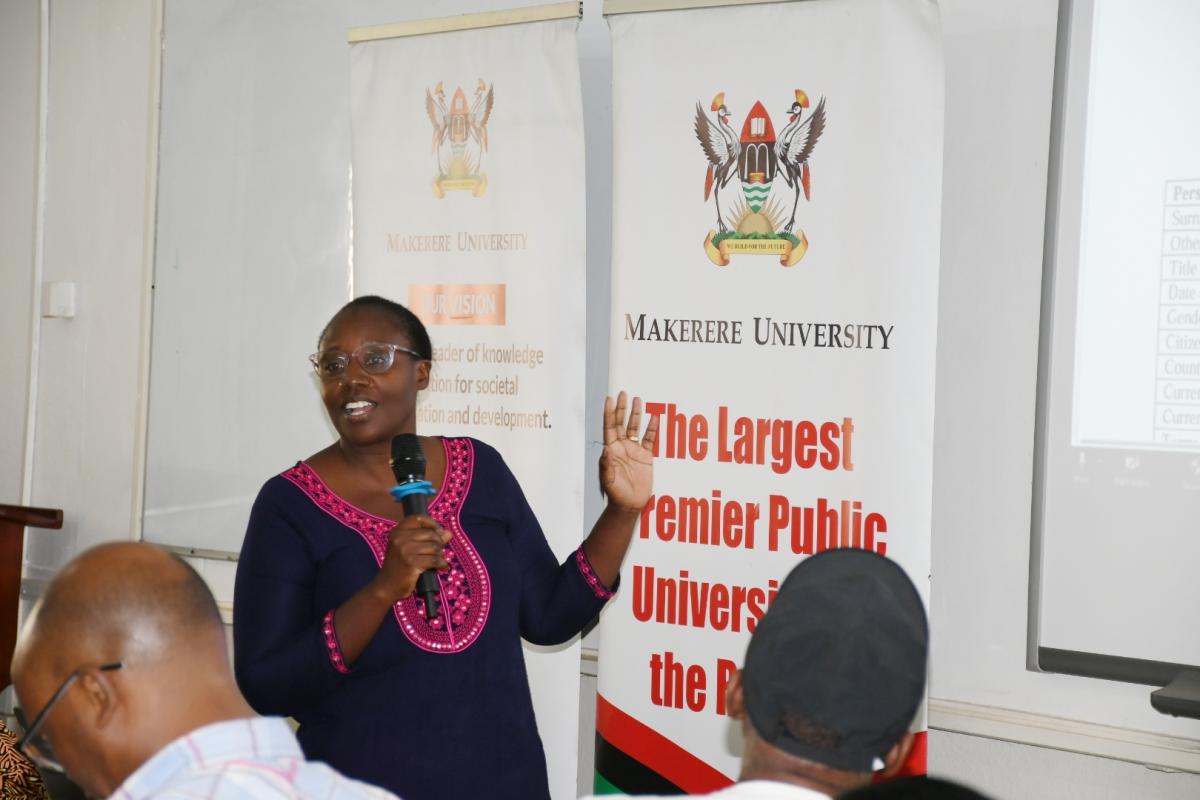
Acknowledging the advances in technology such as Artificial Intelligence (AI), which could help some of the students to write some of the information required, she said:
“We are not saying AI is a bad thing, but let us be minimal in its use. Remember, fruits don't fall far away from the tree. Academic writing is hard work,” she guided.
Sharing experiences by PhD programme Alumni:
Dr. Abudul Mahajubu, a pioneer of the 2017 cohort who studied and completed the programme in three years said hard work, focus and resilience enabled him to complete his PhD in 2020. He read a lot of literature relating to his research area and identified key scholars in his area of study. He worked closely with his supervisors, and he read ahead of his supervisors. He acknowledged his supervisors for involving him in numerous grant writing activities, which not only equipped him with additional skills, but also presented him with other opportunities. He pointed out that he started writing his dissertation at the time when he was handling data collection.
“Embarking on a PhD is never an easy task. However, you need to be focused and read more, love and cherish any step you take however challenging it may seem. Work with your PhD peers and supervisors, and whoever matters to you. Always be positive and do not give attention to other voices that make it seem impossible to complete your study in three years,” said Dr. Mahajubu.
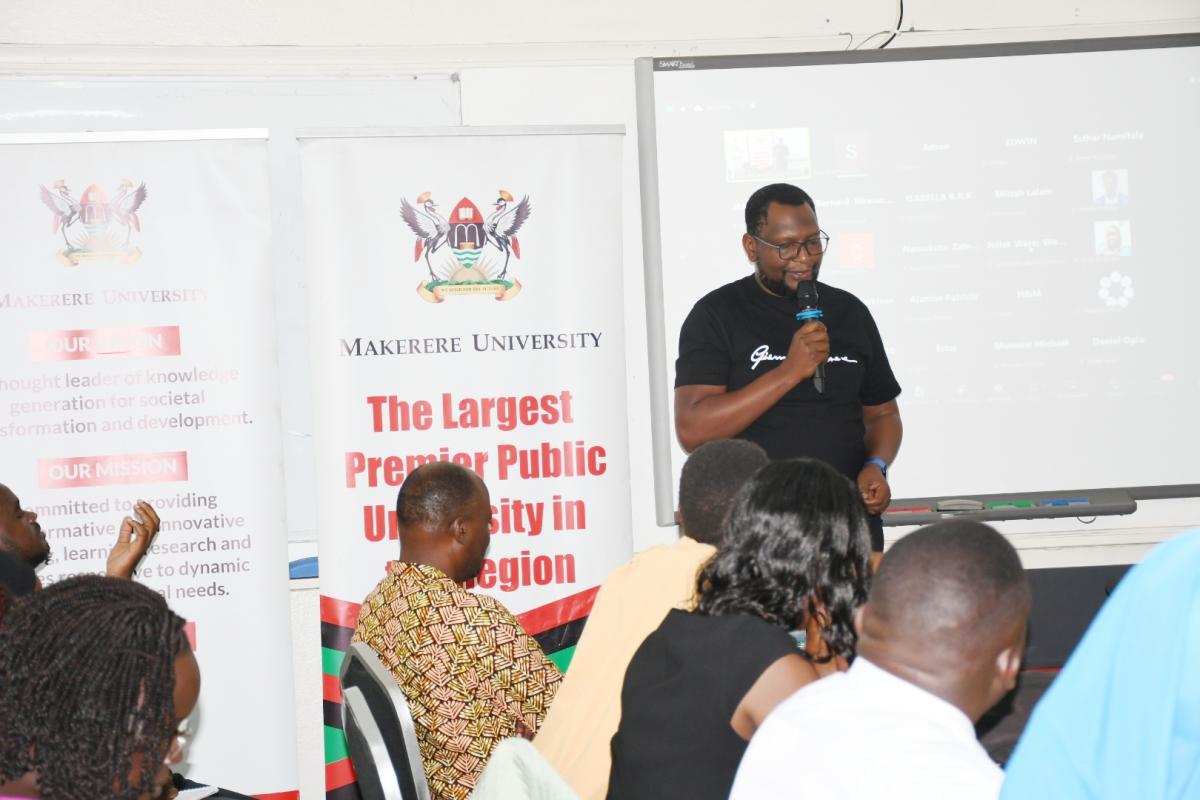
Dr. Samuel Okok, an alumnus of the PhD Programme recounted starting his PhD journey in 2020. He was admitted to the programme in 2021, and due to hard work and commitment, he was able to defend and graduate in February 2024. He informed the prospective applicants that it is possible to complete a PhD within three years.
To manage the PhD timeline, Dr. Okok said that it takes personal initiative and sacrifice as well as a supportive environment provided by the Gerda Henkel fellowship. He assured the prospective applicants that when they succeed and enroll on the programme, the Foundation provides maximum support. He urged them to always build academic relationships with their supervisors, sharpen their academic information literacy and skills, read extensively and begin to begin to write as early as possible.
Ms. Lillian Mbabazi, one of the PhD students currently in her second year pursuing a Doctorate in Applied Theatre at the Department of Performing Arts and Film also shared some insights.
“To make it to the programme, you must feel the fire and be ready to start. I recall everyone calling me a doctor even when I did not have a PhD. This triggered my passion to become one no matter what it would take. I embarked on doing a comprehensive literature review. During that time, I recall visiting the website of the programme funders and I read everything,” she said.
She encouraged applicants to develop a positive attitude which resonates with believing in oneself and knowing that one can do it. She advised applicants to read the call several times, embark on a comprehensive literature review, make use of the networks that they have built over the years, and get recommenders to write objectively about them.
“Sharing your work with critical readers is very important. I managed to identify three (3) critical readers, even before the pre-application workshop. As soon as we finished the workshop, I contacted my recommenders early enough to share with them my ideas. I also shared with them my work, I needed to get somewhere and that was my voice where no one else had spoken already. I would carry whatever I would feel was important in my area of study,” Ms. Mbabazi said.
In his closing remarks, the Deputy Principal, Dr. Awich Ochen credited the Principal-Prof. Josephine Ahikire for mentoring most of staff, and commended her for the stewardship in this interesting programme, which has generated a lot of interest from a wide section of applicants across the African Continent. Re-echoing the fact that this is a very competitive programme, he appealed to the prospective applicants to earnestly embark on the application process. “Give your application time, consult the experts on the team to locate your study, and always look out for other opportunities in the social sciences.”
